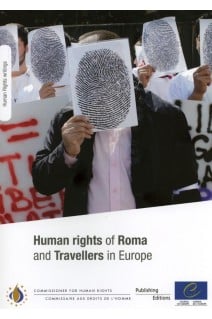



In many European countries, the Roma and Traveller populations are still denied basic human rights and suffer blatant racism. They remain far behind others in terms of educational achievement, employment, housing and health standards, and they have virtually no political representation.Anti-Gypsyism continues to be widespread and is compounded by a striking lack of knowledge among the general population about the history of repression of Roma in Europe. In times of economic crisis, the tendency to direct frustration against scapegoats increases - and Roma and Travellers appear to be easy targets.This report presents the first overview of the human rights situation of Roma and Travellers, covering all 47 member states of the Council of Europe. Its purpose is to encourage a constructive discussion about policies towards Roma and Travellers in Europe today, focusing on what must be done in order to put an end to the discrimination and marginalisation they suffer.
Extracts available in: Albanian, Bulgarian, Czech, French, Hungarian, Italian, Romani, Romanian, Russian, Serbian, Slovak, Spanish, Turkish
Foreword
Summary
Acknowledgements
Introduction
1. Anti-Gypsyism
1.1. Public leaders and anti-Gypsy rhetoric
1.2. Extremist groups
1.3. Media
1.4. Promotion of hatred on the Internet
1.5. Anti-Gypsyism and recognition of the genocide of the Roma during the Second
World War
2. Racially motivated violence against Roma and Travellers
3. Treatment of Roma and Travellers by law enforcement and judicial authorities
3.1. Police abuse of Roma and Travellers
3.2. Roma and Travellers in the justice systems of Europe
4. Respect for private and family life of Roma and Travellers
4.1. Forced and coercive sterilisations of Roma women
4.2. Removal of Roma children from the care of their biological parents
4.3. Common law and customary marriage among certain Roma groups
5. Roma and trafficking in human beings
6. Enjoyment by Roma and Travellers of economic and social rights
6.1. The right to education
6.2. Access to adequate housing
6.3. Access to employment
6.4. The right to the highest attainable standard of physical and mental health
6.5. The right to social security
6.6. Access to goods, services and public places
7. Statelessness and gaps in personal documentation of Roma
7.1. Lack of personal identification documents
7.2. Statelessness in the context of state succession and transformation of the citizenship regime
8. Enjoyment by Roma and Travellers of freedom of movement and international protection inside and outside the state territory
8.1. Free movement within a territory
8.2. International protection and internal displacement
8.3. Collective and individual expulsion
8.4. Exercise of freedom of movement by Roma and Travellers in the European Union
9. Participation of Roma and Travellers in public life and decision-making processes
9.1. Registration and exercise of the right to vote
9.2. Representation in elected bodies
9.3. Representation in consultation mechanisms
9.4. Representation in civil service
Conclusions
Bibliography
Download an extract (1000)

In many European countries, the Roma and Traveller populations are still denied basic human rights and suffer blatant racism. They remain far behind others in terms of educational achievement, employment, housing and health standards, and they have virtually no political representation.Anti-Gypsyism continues to be widespread and is compounded by a striking lack of knowledge among the general population about the history of repression of Roma in Europe. In times of economic crisis, the tendency to direct frustration against scapegoats increases - and Roma and Travellers appear to be easy targets.This report presents the first overview of the human rights situation of Roma and Travellers, covering all 47 member states of the Council of Europe. Its purpose is to encourage a constructive discussion about policies towards Roma and Travellers in Europe today, focusing on what must be done in order to put an end to the discrimination and marginalisation they suffer.
Extracts available in: Albanian, Bulgarian, Czech, French, Hungarian, Italian, Romani, Romanian, Russian, Serbian, Slovak, Spanish, Turkish
Please note that in accordance with our terms & conditions, PDF/epubs may only be purchased by private individuals.
